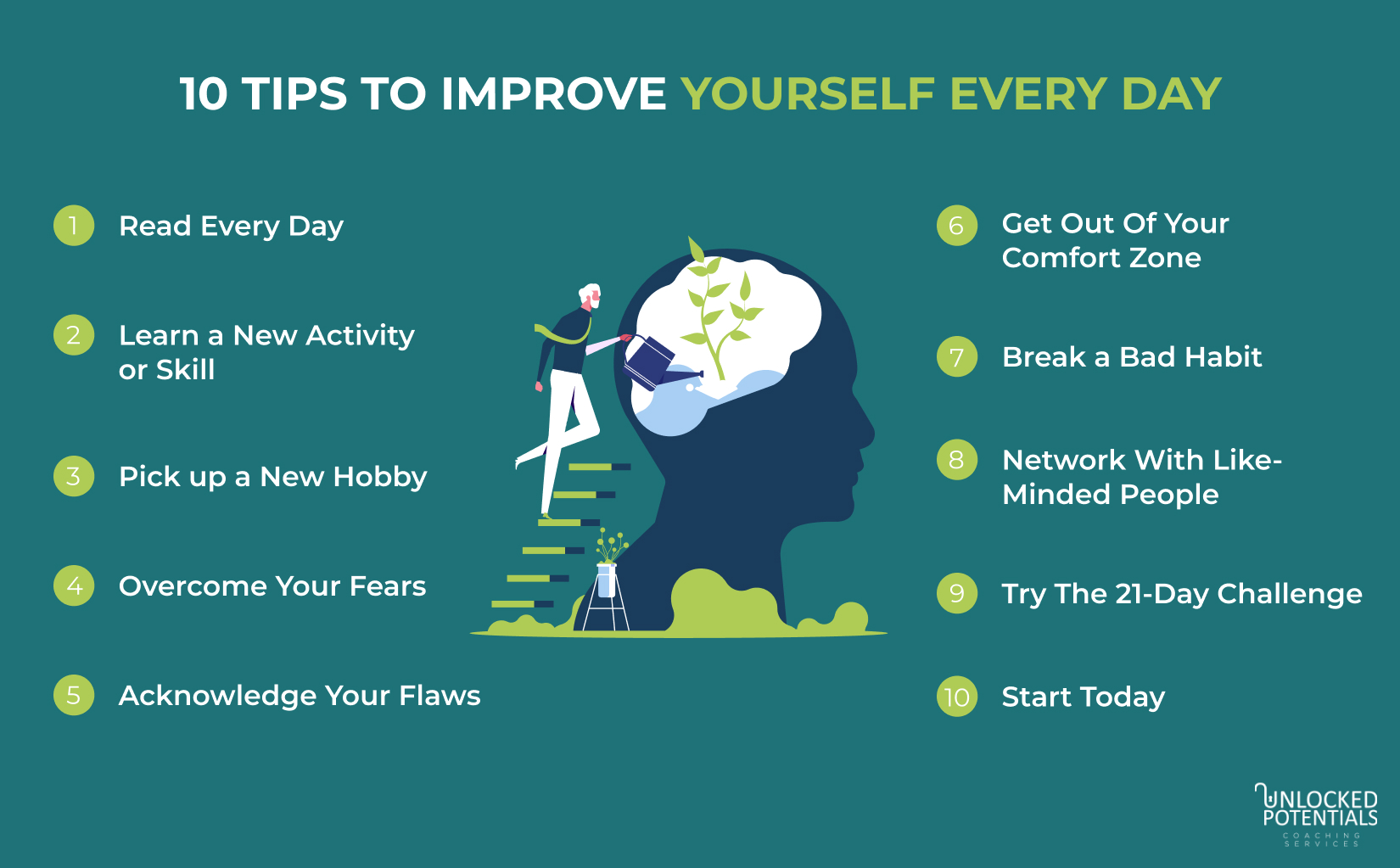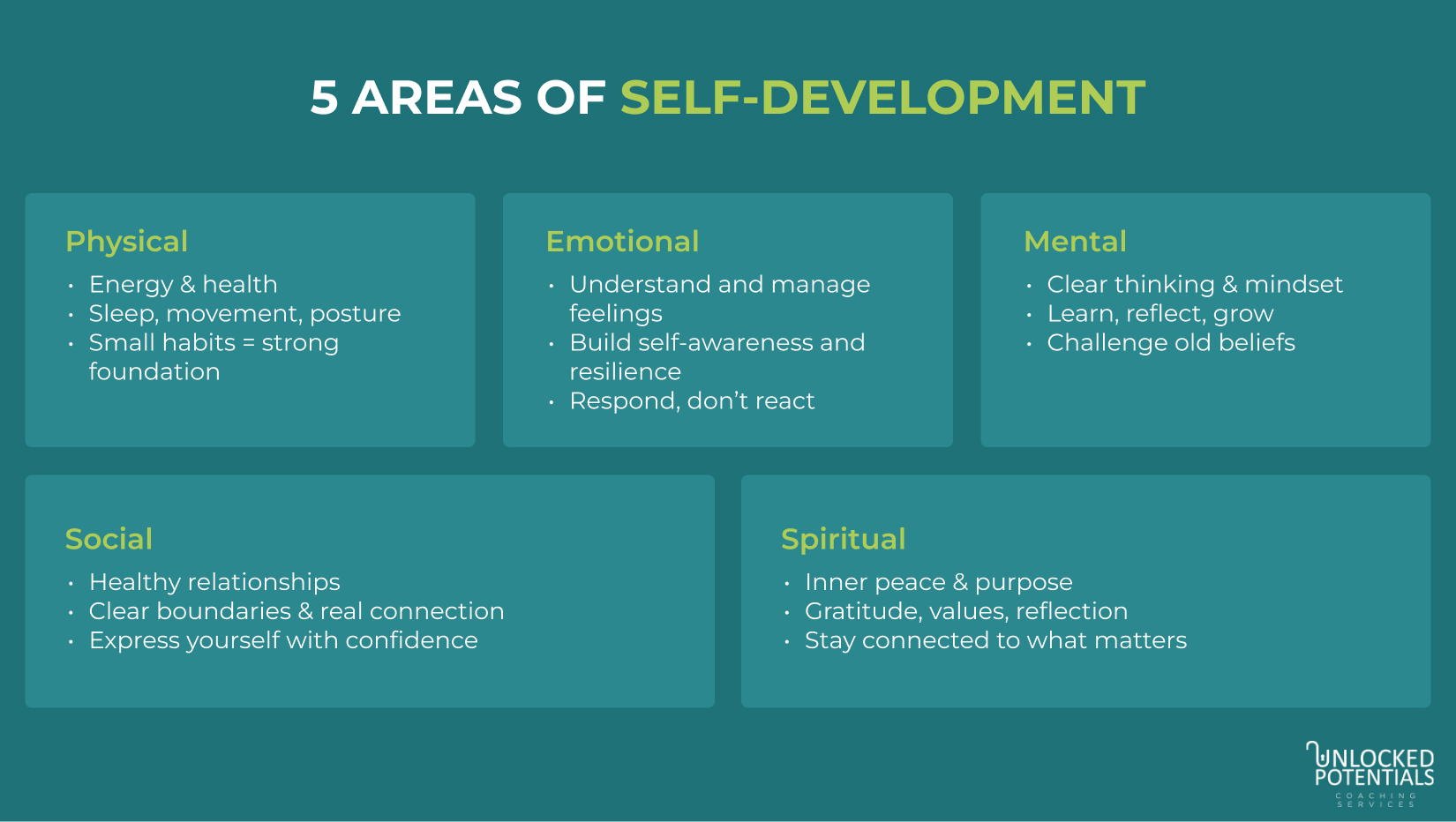Personal Growth: Definition, Examples, and 10 Tips for Self Improvement

If there was ever a time to invest in yourself, it’s now. Also known as personal development and self-improvement, self-growth is one of the most important buzzwords of today. It wouldn’t be wrong to say that the concept of self-growth has an entire empire built around it.;
It revolves around developing your knowledge, wisdom, skills, character, and personality to make you a better person than you were yesterday.;
Even philosophers, theologists, and psychologists are continuously trying to figure out how to reach one’s potential and encourage self-love.;
So if personality development and growth are something you’re trying to achieve this year, here is a list of tips for self-improvement by a life coach to get you started the right way.
What Is Self-Improvement
Self-improvement is the intentional pursuit of becoming a better version of yourself—mentally, emotionally, physically, spiritually, and socially.
In the words of psychologist Abraham Maslow, “Growth must be chosen again and again; fear must be overcome again and again.”
This growth process includes:
- Building new habits
- Letting go of limiting beliefs
- Cultivating self-love
- Developing resilience and emotional intelligence
- Becoming aligned with your purpose
10 Self-Improvement Tips From a Certified Life Coach
1. Read Every Day
Books are one of the most powerful sources of wisdom for self-improvement. The more you read, the more knowledge and wisdom you expose yourself to. Reading daily helps you feed your brain with something new, which is a great way to approach personality development.
2. Learn a New Activity or Skill
Remember that progress is better than perfection when it comes to self-love and personality development. We all have some activity or skill we always wanted to learn since we were kids or teenagers but were afraid to try.;
This is your time to give it a go. You can get professional help, or there are also plenty of ways online to learn new skills for free.
Introducing something new to yourself for self-improvement can be as simple as learning a new sport or a language or something more career-oriented like getting training on problem-solving or teamwork.
3. Pick up a New Hobby
Aside from your usual or favorite hobby, make space for other hobbies that can help you develop new skills. Learning a new hobby will require you to stretch yourself in physical, mental, and emotional aspects, which is a good approach for personality development.;
For example, try picking up hobbies like pottery, Italian cooking, wine appreciation, tea tasting, or gardening. Uncommon hobbies help you to learn a lot outside of the scope and discover self-love.
4. Overcome Your Fears
As humans, we all have fears that we find difficult to overcome. Whether it’s the fear of public speaking or the fear of uncertainty, your fears keep you in the same position or boundaries, leaving no room for self-improvement.
Recognize that your fears can be areas that are restricting you from attaining personality development. One of the best ways to identify your fears and overcome them is to get professional self-improvement tips by a life coach or a counselor.
5. Acknowledge Your Flaws
Everyone has flaws, and that is what makes us humans. However, it is important to identify, understand, acknowledge, and address them through self-improvement practices. Sit and think about your flaws, write them down, and analyze how you can work on them or how to manage them.;
Remember that acknowledging flaws is not about finding things wrong with you but finding areas you can improve to make you a better person tomorrow. It is a stepping stone towards self-love.;
6. Get Out Of Your Comfort Zone
No growth comes from your comfort zone. Real change comes from hard work and sweat while facing the uncomfortable. Being too comfortable doesn’t help us grow; it only makes us stagnate.
Try getting out of your comfort zone by saying “Yes” to opportunities that can open you to new goals. Take time to identify your comfort zones and find out how you can step out of them little by little and make minor changes for personality development.;
7. Break a Bad Habit
Is there any bad habit that you think is limiting you from doing better? It can be oversleeping, smoking, drinking, or even procrastinating.;
List your bad habits from high to low and try to devise methods for eliminating them one at a time. Self-improvement tips by a life coach can provide a professional guide that can be very helpful in hacking your habit loop, breaking bad habits, and building good ones.
8. Network With Experts
Successful people have achieved results by adapting themselves to the right attitude, skill set, and know-how.;
As any expert is likely to have gone through failures, you can get hands-on experience from them and make sure you are planning your vision with fewer mistakes.;
After all, what is a better way to learn self-growth than from successful people who have started from scratch?
9. Try The 21-Day Challenge
There is much scientific and medical research that says if you try to practice a habit for 21 days, it will feel manageable afterward. This primarily stems from Dr. Maxwell Maltz’s observations of his patients, who typically adjusted to changes in their appearance or environment within three weeks.;
This 21-day period serves as a psychological milestone that encourages commitment without being overwhelming.
However, modern research challenges this time period and says the time required for habit formation varied widely, ranging from 18 days to 254 days.;
This means that the 21-day timeframe might not be a one-size-fits-all rule, but it still holds value in initiating change. The initial 21 days serve as a crucial starting point, laying the foundation for habit formation.;
Not to mention, this requires a strategic approach from appropriate goal setting and planning to track progress and find loopholes that deviate from the achievement of expected goals.;
10. Start Today
Starting today, you can begin transforming your life with simple, practical steps. Self-improvement is not about overhauling your entire routine overnight; it’s about making small, intentional changes that accumulate over time.;
Begin by setting clear goals that align with your values and aspirations, providing you with direction and purpose.
Cultivating mindfulness can help you stay present, reduce stress, and enhance focus, making each moment more productive.
Additionally, adopting a growth mindset encourages continuous learning and resilience, empowering you to embrace challenges as opportunities for personal development.
If you are unsure where to start, self-improvement tips by a life coach are the best way to give you a roadmap on how you can begin this journey of self-improvement and personality development.
5 Core Areas of Self-Growth
Self-growth is not a one-dimensional process. To grow in a meaningful and lasting way, you must develop across multiple areas of your life. True personal growth involves progress in your physical health, emotional maturity, mental clarity, social connection, and spiritual depth. These five core areas are deeply connected, when you nurture one, it often supports growth in the others.
Here’s a full breakdown of each area, along with clear examples to help you recognise how they show up in everyday life.
1. Physical
Physical growth is the foundation of all other areas of self-development because your body directly impacts how you think, feel, and function. This type of growth is not limited to fitness or appearance, it’s about improving your physical health in ways that enhance energy, resilience, and performance.
For example, regular exercise improves focus and reduces anxiety, while quality sleep boosts memory and emotional regulation. You can support your physical growth by doing small, intentional things: waking up 30 minutes earlier to stretch or walk, replacing processed snacks with whole foods, drinking more water during your workday, or building a consistent sleep routine.
Even something as simple as improving your posture or breathing patterns can lead to better physical awareness and overall well-being.
2. Emotional
Emotional growth involves understanding your emotions, managing them in healthy ways, and using that emotional awareness to navigate relationships and challenges. It’s not about suppressing difficult feelings, but about responding to them with maturity and intention.
For example, if you tend to feel anxious in social settings, emotional growth might involve identifying the root of that anxiety and learning techniques to calm your nervous system, such as breathwork or grounding exercises.
3. Mental
Mental growth is about developing the way you think, learn, and understand the world around you. It involves strengthening your mindset, improving your ability to solve problems, and challenging the beliefs that hold you back. Unlike emotional growth, which is about managing feelings, mental growth focuses on building clarity, critical thinking, and focus.
One way to grow mentally is by developing a more flexible and resilient mindset. This means recognising when you’re thinking in fixed patterns.
For example, believing you’re not capable of doing something, and actively replacing that thought with a more constructive one, such as, “I’m not good at this yet, but I can improve with effort.” This shift helps you take on new challenges instead of avoiding them.
4. Social
Social growth is the process of improving how an individual relates to others through more effective communication, empathy, and healthier interpersonal boundaries. It involves becoming more aware of the way your actions, tone, and presence affect other people, and how their behaviours, in turn, influence you.
For example, if you often feel taken for granted in friendships or at work, social growth may involve learning how to express your needs clearly and respectfully. This could include saying “no” without guilt or addressing conflict with empathy rather than avoidance.
Social growth invites you to show up more authentically. Instead of pretending to be someone you’re not to fit in or be liked, you begin to feel more comfortable expressing your values and being seen for who you truly are. Over time, this leads to stronger connections built on trust. It also encourages you to invest your time and energy in people who support your wellbeing and personal self.
5. Spiritual
Spiritual growth is about connecting with a deeper sense of meaning, purpose, or inner peace. It doesn’t necessarily relate to religion, although for some people it might. At its core, spiritual development is about living in alignment with your values and maintaining a connection to something greater than yourself, be it nature, a faith, humanity, or your inner conscience.
For example, taking time each day to reflect on what truly matters to you, expressing gratitude, or contemplating your role in the world all contribute to spiritual growth. It might also mean exploring mindfulness practices such as meditation, or creating rituals that help you slow down and reconnect with your intuition.
Spiritual growth helps you find direction in difficult times and cultivate a sense of calm that’s not reliant on external circumstances. It often brings clarity around what you stand for and the legacy you wish to leave behind.
Frequently Asked Questions
How do I start my self-improvement journey if I don’t know where to begin?
Start by identifying one area of your life that feels out of sync. This could be your energy levels, your confidence, your focus at work, or how you manage stress. You don’t need to fix everything at once. Begin with one small change—like journalling in the morning, going for a short walk daily, or setting a clear boundary in one relationship. Working with a coach can also help you figure out what matters to you and where to start.
Is personal growth only for people going through a crisis?
Not at all. Many people explore personal growth when life feels fine on the surface, but they’re feeling stuck, restless, or disconnected inside.
How is coaching different from therapy or mentoring?
Therapy focuses on healing the past. Mentoring offers advice based on someone else’s experience. Coaching is future-focused and helps you move forward based on your own strengths, values, and goals. At Unlocked Potentials, coaching is a partnership that helps you clarify what you want and supports you in taking meaningful steps to get there.
Is coaching relevant to the UAE’s fast-paced lifestyle and cultural expectations?
Yes. Many clients in the UAE deal with high pressure, fast change, and balancing multiple roles at home and at work. Coaching can help you manage this pace in a way that doesn’t burn you out or disconnect you from yourself.
- September 2025
- August 2025
- July 2025
- June 2025
- May 2025
- April 2025
- March 2025
- February 2025
- January 2025
- December 2024
- November 2024
- October 2024
- September 2024
- August 2024
- July 2024
- June 2024
- May 2024
- December 2023
- November 2023
- August 2023
- July 2023
- June 2023
- May 2023
- April 2023
- March 2023
- February 2023
- January 2023
- December 2022
- November 2022
- October 2022
- September 2022
- August 2022
- July 2022
- June 2022
- May 2022
- April 2022
- March 2022
- February 2022
- January 2022
- December 2021
- November 2021
- October 2021
- September 2021
- August 2021
- July 2021
- June 2021
- May 2021
- April 2021
- March 2020
- February 2020
- January 2020
- December 2019
- November 2019
- October 2019
- September 2019
- August 2019
- July 2019
- June 2019
- May 2019
- April 2019
- March 2019
- February 2019
- January 2019
- December 2018
- November 2018
- October 2018
- September 2018
- August 2018
- July 2015
- May 2014











